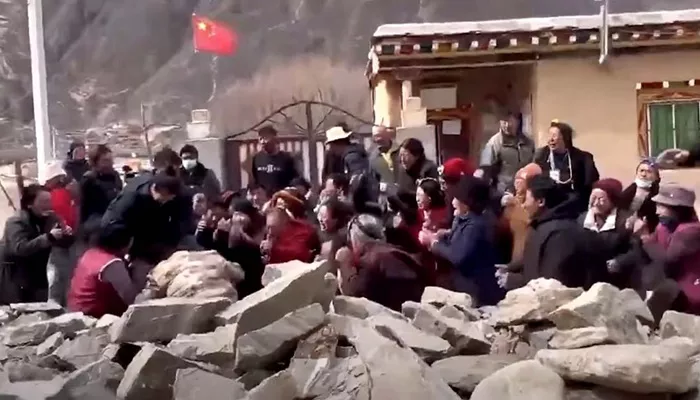Two Tibetan monastic leaders have been sentenced to three to four years in prison for participating in rare public protests against Chinese hydroelectric dam plans in 2024, two sources in the region told Radio Free Asia.
According to the sources, Xire, abbot of Yena Monastery in Wangbuding Township, Derge County, Ganzi Tibetan Autonomous Prefecture, Sichuan Province, was sentenced to four years in prison, and the administrative head Gongbu was sentenced to three years in prison.
The sources requested anonymity for fear of retaliation. It is not clear when the verdict will be handed down.
The sources said Gongbu was in critical condition due to torture in detention and had been transferred to the intensive care unit of West China Hospital in Chengdu.
In February 2024, the two abbots of Yena Monastery were detained along with hundreds of Tibetan monks and local residents for peacefully calling for a halt to the construction of the 1,100-megawatt Gangto Dam on the Jinsha River.
The dam would submerge several historic monasteries, including Yena Monastery and Wangto Monastery, and force residents of at least two major villages to relocate.
Many of the detained protesters were severely beaten during interrogations, and some required medical attention, sources told RFA at the time.
Most were released the following month, but key monastery and village leaders whom authorities suspected of playing a leading role in the protests — such as Wangto senior administrator Tenzin Sangpo and village official Tenzin — were transferred to a larger county detention center.
The crackdown on Yena Monastery was particularly harsh. Sources told RFA that authorities targeted monks for “intensive rectification and re-education,” emphasizing their political ideology and accusing them of acting as “important informers.”
“The government really went hard on Yena Monastery, as if to vent its anger,” the first source told RFA. Officials said the two monastery leaders should be “severely punished,” especially for their decision to seek and hire legal representation.
In 2024, a video showed the abbot of Yena Monastery, Xirao, giving two thumbs up in a traditional Tibetan begging posture, and he and other Tibetan monks and local residents openly cried and pleaded with visiting officials on February 20 not to proceed with the planned project.
Sources told RFA that more than a year after the protests, the area on both sides of the Dechu River remains under strict surveillance, and the movement of monks and residents in monasteries and villages in Wangbuding Township is restricted.
Authorities have set up multiple checkpoints on the border between the Tibetan areas of Sichuan and the Tibet Autonomous Region to strictly control the entry and exit of people.
Only Tibetans with transit permits issued by the police can pass through the checkpoints set up on the road leading to monasteries such as Yena Monastery and Wangtuo Monastery located near the river, the sources said. Even Han Chinese with transit permits are prohibited from entering, they added.
“The entire area has been effectively blocked, and nearly 4,000 residents and monks in villages and monasteries near the river are in collective confinement and have lost all freedom of movement,” said the second source.
The sources said surveillance is heightened during periods deemed politically sensitive by Chinese authorities, such as the anniversary of the March 10 Tibetan Uprising Day in 1959 or the birthday of Tibetan spiritual leader the Dalai Lama on July 6.
During “sensitive periods,” Tibetans without local household registration are denied entry, the sources said, while local villagers travelling from rural areas to Derge county must apply for transit permits, which are often denied.
The Gangtok dam, planned for Derge county, is part of a massive 13-stage hydroelectric project by the Chinese government on the Dequ River with a total planned capacity of 13,920 megawatts.
Chinese officials had said the project would proceed as planned after last year’s protests, but the sources said it was unclear when or if construction would start.
“Even if the project ultimately fails to go ahead, the monks and residents of the surrounding villages have already been deeply hurt,” the first source said.

